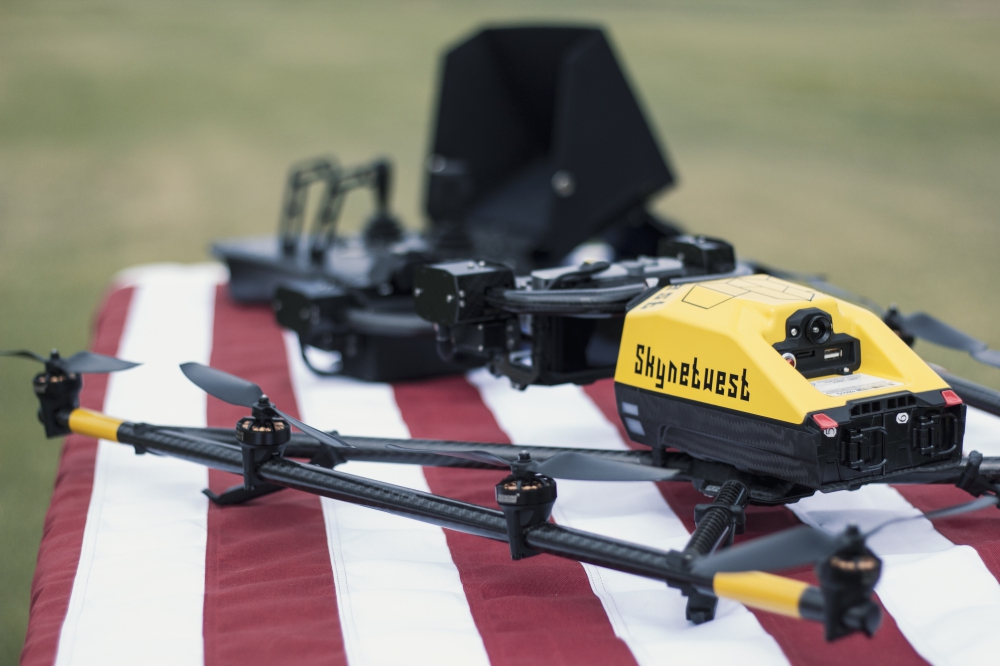High resolution aerial photogrammetry can be captured in a matter of minutes, providing utility service providers with an accurate view of multiple grid components. Contrary to manned missions that require a helicopter or human team to inspect lines, a UAS can collect data in a fraction of the time and mitigate the potential for injury. Through a wireless downlink, this data can be viewed in real-time by utility workers, and data can be transferred to the utility company post-flight in a manner of minutes.Capability
UAS service providers such as Skynetwest LLC are capable of producing quality data regarding the system health of the entire power grid. Multispectral data gives utility companies the capability of seeing the full picture behind the equipment. A multi axis gimbal, combined with a complex integrated autopilot and gyroscope yields accurate photogrammetry that is difficult to parallel, even with manned aerial operations. Side by side HD 30x zoom photos and thermal infrared imagery give the utility inspection team an unparalleled ability to determine the functional status of LTC compartments, cogeneration refractories, field exciters and a multitude of other electrical components.
Assessment of overhead lines and substations system health in real-time or with minimal delay allows utility management to quickly plan and execute necessary repairs, while reducing the need for hands-on inspection of functional components. This data provides an updated view of the power grid that is pivotal in making decisions for future revisions, and can be done without costly service interruptions. Additionally, the high resolution data can be used to make more accurate management decisions with respect to vegetation control and frequency of inspections. Several scans done over different times of day to differentiate power demand allow adjustments to cost scheduling as the service provider sees fit. Unlike overhead power lines, substations present a unique risk when inspections are necessary. However, multirotor UASs are capable of hovering above the substation, gathering data from multiple perspectives without the need to enter the substation.
A critical factor in electrical grid inspection is the time and resource commitment required for inspection. While best estimates put manned power pole inspection at approximately 8 to 12 poles per day of work per team, UAS service providers like Skynetwest LLC are able to carry out inspections at an average of 8 to 20 poles in a single flight revolution, lasting approximately 20 minutes. Substation inspection requires only two 20 minute flights to acquire all the imagery needed to determine system health. The increased rate of inspection, which includes both IR and standard RGB imagery, adds to the attractiveness of an unmanned aerial system for utilities inspection. This time reduction equates to more efficient and reliable power service for end users, and limits the potential for dangerous exposure to high voltage equipment.
Safety
Safety with respect to utility inspection is of paramount importance; as a professional UAS flight service provider, Skynetwest LLC parallels this commitment to safety. A professional grade UAS, combined with an advanced safety management system allows Skynetwest LLC to inspect utility components with the highest level of safety.
According to the Bureau of Labor Statistics 2015 Study, Electrical power line installers and repairers were listed in the top 10 occupations with high workplace fatalities. Falls to a lower level also ranked second in the potential for workplace fatalities. Electric service providers have made marked improvements in safety in recent years, but use of a UAS to inspect electrical grids all but eliminates the need for workers to elevate themselves above ground level for inspection.
Contrary to hobby or photography grade ‘drones’, professional UAS such as the Falcon 8+ are equipped with redundant autopilot and data links that limit the possibility of crashing. Onboard sensors and shielding detect and limit electromagnetic interference, prohibiting the UAS from being negatively affected during flights near EM field generating components common in the electrical grid. The Ground Control Station (GCS), as opposed to an ordinary remote control, relays flight information to the operator(s) who can act accordingly, piloting or landing the aircraft in the event a signal loss is inevitable.
Complementing the UAS and GCS is a commitment for safety executed via a safety management system (SMS) and standard operating procedures (SOPs). Skynetwest LLC has dedicated time and testing to create a system of positive crew coordination and has practiced emergency scenarios that encompass a broad variety of situations that go well past those found in a standard UAS operator manual. The SMS and SOPs are rigorous mandates for UAS operators that supplement FAA part 107 regulations, and are embedded through detailed pilot and crewmember training regimens executed by Skynetwest LLC.
Results
Continued increase in electricity demands on the Navopache Electric Cooperative electric substations and transmission lines require high quality inspections to maintain operational status. As witnessed during the NEC demonstration, Skynetwest LLC can provide enhanced data with respect to electric grid infrastructure components. The Falcon 8+, with its ability to perform upward and downward facing views of all system components as well as IR and RGB overlays is a leap forward in utilities inspection. Complimentary time reduction, combined with an impeccable safety record rewards the industry with venerable a successor to standard power inspections performed by manned teams. Skynetwest LLC and NEC represent viable partners that have taken a leap forward in utilities maintenance that promote reduced time and resource consumption, an impeccable safety record, and enhanced data.

